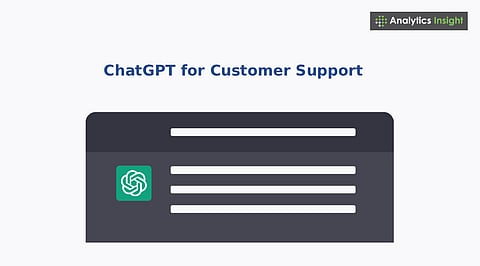

ChatGPT reduces response time while maintaining natural and engaging replies.
AI can handle repetitive queries, leaving complex issues for human agents.
A balance of automation and empathy ensures customers feel valued, not ignored.
Customer service is one of the most crucial aspects of running a business. Organizations that offer timely responses to consumers’ queries tend to retain them for a long time. This helps the brand build trust within its user community and gain loyal advocates.
With the increased adoption of artificial intelligence and other advanced technologies, customer service has become more streamlined. Companies can utilize tools like ChatGPT to automate replies for frequently asked questions, handle easy tasks, and reduce wait times.
However, if the response is robotic, it might hurt the brand’s reputation and lead to the loss of potential customers. This article provides a detailed overview of how to use ChatGPT in customer support.
Support teams often receive repetitive questions about shipping, prices, refunds, and account recovery on an everyday basis. Catering to each customer manually can be time-consuming. ChatGPT-powered chatbots, on the other hand, can handle thousands of such tasks within seconds, allowing the support teams to take care of the more difficult requests.
Solving customer queries as quickly as possible is crucial for support teams, as any delay in response can lead to complaints or a drop in sales. The faster you answer, the happier your customer will be.
AI bots can help with this process by swiftly attending to multiple customers simultaneously. They can provide users with how-to guides, check on order status, or give details about upcoming sales. This, in turn, helps increase the number of returning customers.
Also Read: Are Healthcare & Customer Service Jobs at Risk in the AI Automation Era?
Replies generated by ChatGPT can sound robotic. However, training chatbots using NLP techniques can help them sound like humans. The conversations can be tuned to have a friendly or professional tone depending on the company’s brand voice.
Though ChatGPT-enabled bots are helpful, they can not solve every issue a buyer has. Complex problems or sensitive complaints still require human guidance. Using a hybrid approach is the best, most appropriate solution.
Support teams can get stressed from too much work. ChatGPT-powered bots can automate most tasks in customer service and reduce the workload. They can collect feedback, process it instantly, and offer insights for improvement. The bots can guide the users on how to begin using specific platforms, products, or services, saving the support team’s time and effort.
Training ChatGPT bots with business-centric information helps them generate customized responses. For example, companies can train the machines on FAQs, product details, and customer data. This ensures the answers provided are correct and helpful. Frequently updating the training datasets can help the bot understand what customers want.
Most companies today are turning to emotional artificial intelligence to handle customer service. Emotional AI bots use advanced algorithms and NLP sentiment analysis to identify customers’ feelings and reply accordingly. This results in more engaging conversations and human-like interactions.
Also Read: Revolutionizing Customer Service with Generative AI
Using ChatGPT in customer support helps organizations in several ways:
Financial Savings: Using bots reduced the need for hiring unnecessary manpower.
Always On: People can get assistance anytime, anywhere.
Minimal Margin for Errors: The answers provided always follow the company rules and guidelines.
Easy to Scale: As your business grows, the chatbot's capability to handle more customers also grows. It can manage the user base without the need to hire more people.
A ChatGPT-enabled chatbot is now one of the most important tools in customer support, considering the strategic overhaul we are seeing in almost all organizations. It offers faster answers, reduces workload, and automates most routine tasks, saving time and effort. By using NLP techniques and advanced algorithms, these chatbots can sound more human and support businesses as they scale their operations.
1. Q: Can ChatGPT fully replace human customer support agents?
A: No, it works best when paired with humans for complex issues.
2. Q: How does ChatGPT improve customer support speed?
A: It replies instantly to common questions, reducing wait times.
3. Q: Is ChatGPT capable of handling sensitive customer complaints?
A: Sensitive or complex complaints are better handled by human agents.
4. Q: Can ChatGPT be trained for company-specific queries?
A: Yes, it can be customized with FAQs, product data, and policies.
5. Q: What is the main benefit of ChatGPT in customer service?
A: It saves time, reduces workload, and improves customer satisfaction.
